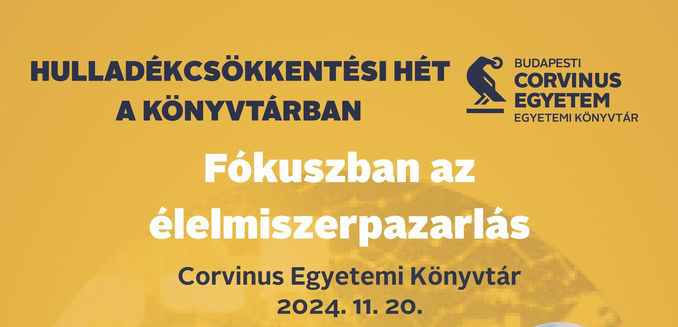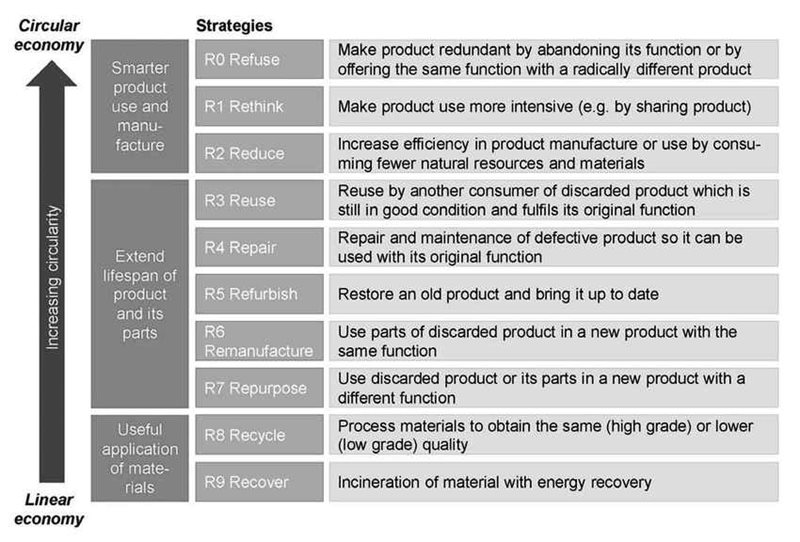Ready for the 10R model? Waste reduction is the sustainability theme of the month for November

Our vision for November:
Today, the evening starts with the calm of familiar sounds: first the wind chime on the door of our university community café, then the refill bottles in the bags of the new arrivals start to play as they put their coats on the rack. I can also spot the familiar pieces: they’ve either turned up at our repair shop or our small secondhand shop.
We’re open every night to bring the local community together. One night we sew clothes, another night we sort through the thrift shop for something to buy. Demand is a very unique issue here. Is it good if a lot of people buy from us, or is it good if anywhere but a few? Our marketing department would shake its head if we had one.
Other times we assemble items together so that they serve us for a long time. And we serve the Earth, as our long-forgotten ancestors once did. Not so long, but a few years ago, we had selective bins. Now they are useless, with so little in them. We recycle everything ourselves: reuse, reinterpret, recreate, compost. Even coffee grounds can go in. This year, the packaging-free shop’s goods will also come in a re-packaging kit.
Tonight is a special night, it is Black Friday, which is also our fifth birthday. At first many of us thought this opening date was just trolling, but now more and more of us understand. It was not enough to abolish the shopping holiday; we needed something to replace it.
Today, real needs and the circular economy are the topics of conversation before the concert. We are recycling more and more things, but there is still a lot of waste in between. We know the best circularity is the one that is not created unnecessarily. And happiness is what the community gives us. Real happiness, not junk.
We should first reduce the numbers, then comes recycling
More than 430 tonnes of waste is collected from Corvinus University campuses and colleges every year, which is equivalent to about 840 average EU citizens’ municipal waste per year. This figure was 513 kg per capita in 2022.
Reducing the waste burden would be important not only to eliminate pollution of terrestrial and marine ecosystems and to protect biodiversity, but also to reduce carbon emissions. From the extraction of the fossil fuels needed to make polymers to the transport and disposal of waste, single-use plastics produced 450 million tonnes of planet-warming greenhouse gases in 2021 alone , according to a New York Times article.
While there has been a lot of talk about selective waste collection in recent years, it should only be the last step if we are really serious about solving the waste crisis. The model, initially called 3R, then 5R and now 10R in many places, aims to show how much we can do before recycling.
- The best waste is that which never exists in the first place. If you don’t need it, refuse to buy it, and if you do, choose a more efficient alternative (for example, by shared tools) or a product with less unnecessary waste.
- We can also increase the life cycle of the product, reducing the amount of waste that is generated. This includes reuse, repair, refurbishment and reimagining, which could be done, for example, in the Repair Café presented in the vision.
- At the end of the model comes the recycling of materials, which requires selective collection and recycling. And if this is not feasible, the end of the process is incineration, which means recovery as energy. The aim, of course, is to avoid as much of this as possible.

The 10R framework. Source: Kirchherr et al (2017, p. 224).
The circular economy model is important, but not enough for our sustainable future, as we wrote in an article last year. It also requires a change in mindset for businesses, regulators and consumers alike. On the one hand, we need to move away from linear thinking towards an understanding of the material cycle. On the other hand, we also need to change our lifestyles and consumption habits if we want to produce less waste.
The social and environmental impact of food waste is also significant
594 thousand tonnes of food waste are generated annually in Hungarian households, of which 247 thousand tonnes are pure waste, according to Nébih data. This represents 62 kg per person per year, of which 25.8 kg could be prevented.
“Globally, food waste in households is responsible for 50-60 percent of the total food waste in the food chain (Eurostat, 2022). The survey shows that the causes of food waste are mostly due to inattention and inadequate planning. For example, household members forgot about food or bought or cooked too much, which went bad,” says the Nébih’ s No Leftovers programme.
The UN Food and Agriculture Organisation (FAO) estimates that around 1.3 billion tonnes of food is wasted worldwide every year, roughly 33% of all food produced. This is more than the annual food needs of the world population suffering from malnourishment, indicating a social problem caused by unequal distribution.
The burning problem of food waste is also being highlighted by the European Week for Waste Reduction 2024, which the Corvinus Library joined this year. Accordingly, between 18 and 24 November, exciting programmes are being prepared and all university citizens, students and staff are invited to join in. Film screenings are planned in the lending space throughout the week and a photo competition is open until 15 November. And on 20 November, a full afternoon of activities is planned, with more details on the poster and Facebook event.
We can do much to reduce our waste burden by living more consciously
And finally, we conclude our usual introductory article with challenges that we can all do to reduce our waste burden and at the same time move towards a more conscious lifestyle together.
- For one week, observe the types of waste that appear in your waste bin in the highest proportion. Were there any that could have been avoided or that you didn’t really need?
- Make a shopping list the next time you go shopping! Only buy what your list shows you really need!
- Instead of buying water in plastic bottles, use your own refillable bottle! You’ll find water dispensers at many locations around campus where you can fill up with filtered, high-quality water.
- Try not buying anything with plastic waste for a week!
- Try a packaging-free shop near you! To do this, we recommend Beeco’s map, where you can find several such shops.
- Try a repair shop, a shoe mender or a tailoring shop before you buy a new product instead of something new! You can find these places on the Beeco map.
- Check out the Corvinus Library’s European Week for Waste Reduction on 20 November, where food waste will be discussed! Details of the event can be found on the attached poster and in this Facebook event.
- Read the article by Corvinus students, “Why no deposit on phones? – The dangers of electronic waste” on electronic waste. What can you incorporate into your own life?
- On this year’s Black Friday (29 November), have an anti-Black Friday day, when you don’t buy any products!
- Share your most interesting experiences and lessons you’ve learned from trying new things this month in a story, post or in person with your friends! If you like, tag Corvinus too!
Author: Máté Kovács